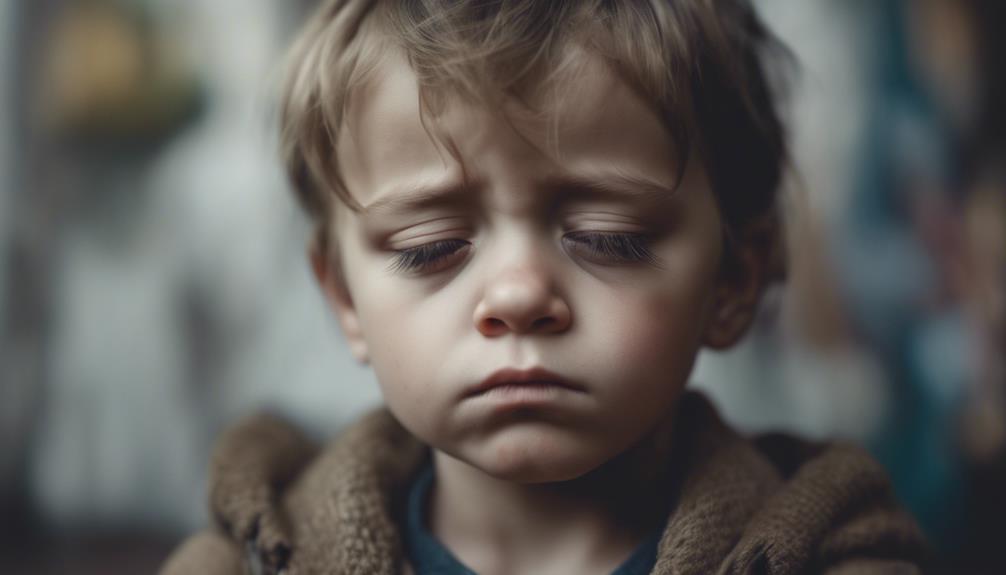As observers of child behavior, we can pinpoint significant characteristics hinting at scapegoating dynamics: emotional distress, defiance towards authority, persistent guilt, self-worth struggles, trust issues, emotional disconnection, and a deep desire for acceptance. These traits serve as red flags within family units, spotlighting potential scapegoat situations that warrant attention and support. Further insight into these behaviors can illuminate the intricacies of such roles and their impact on a child's emotional well-being. More information on these characteristics awaits for a thorough understanding of scapegoat child dynamics.
Key Takeaways
- Anxiety, depression, and mood swings as signs of distress.
- Defiance against authority figures due to mistreatment.
- Persistent feelings of guilt leading to excessive apologies.
- Struggles with self-worth from lack of validation.
- Difficulty trusting others due to past hurt and skepticism.
Signs of Emotional Distress
In some cases, scapegoat children may exhibit signs of emotional distress, including anxiety, depression, and mood swings. These manifestations of inner turmoil can stem from the constant blame and criticism they endure, leading to feelings of low self-esteem and worthlessness. Trust issues often develop as a defense mechanism, making it challenging for them to form healthy relationships or express their emotions openly. The weight of being unfairly singled out can result in post-traumatic stress disorder (PTSD) symptoms like flashbacks, nightmares, and avoidance behaviors.
It's important to recognize these signs of emotional distress in scapegoat children early on to provide them with the support and understanding they need. Encouraging open communication, offering validation, and creating a safe space for them to share their feelings can help alleviate some of the burdens they carry. Building trust through consistency and empathy is key to assisting them in maneuvering through their struggles and fostering a sense of security in their interactions with others.
Defiance Against Authority Figures

Upon facing mistreatment and unjust criticism, scapegoat children often exhibit defiance against authority figures, challenging unfair rules and behaviors. This defiance is an essential response to the mistreatment they endure, driven by a strong sense of justice and a refusal to accept unfairness. Scapegoated children may resist complying with unreasonable demands or unjust treatment as a way to protect themselves from further harm. Defiance against authority figures serves as a coping mechanism for these children, allowing them to assert their boundaries and stand up against mistreatment.
It is vital to recognize this defiance as a signal of the underlying issues that scapegoat children face. By understanding their resistance to unfair treatment, we can offer support and guidance to help them navigate challenging situations. Encouraging open communication and providing a safe space for them to express their feelings can empower these children to assert themselves in a healthy and constructive manner. Through empathy and validation, we can help scapegoat children develop resilience and self-confidence in the face of adversity.
Persistent Feelings of Guilt

Vital feelings of guilt plague scapegoat children, burdening them with a heavy sense of responsibility for actions beyond their control. These children often find themselves apologizing excessively, seeking validation and reassurance from others to alleviate their guilt. The weight of this constant self-blame can lead to deep-rooted self-doubt and a pervasive sense of low self-esteem. As they internalize blame for situations not of their making, their mental health may suffer, impacting their overall well-being and relationships.
It is essential to recognize these signs of guilt in scapegoat children and offer them support and understanding. Helping them understand that they aren't to blame for everything that goes wrong can gradually alleviate their burden of guilt. Encouraging open communication and providing reassurance can aid in boosting their self-esteem and fostering a healthier mindset. By addressing these feelings of guilt early on, we can prevent further negative impacts on their mental health and help them build a more positive self-image.
Struggles With Self-Worth

Amidst the relentless pressure and criticism, scapegoat children often find themselves grappling with profound struggles regarding their self-worth. The constant barrage of negative messages and blame directed at them by the narcissistic parent can deeply impact their self-esteem, leading to feelings of worthlessness. Scapegoat children may internalize these damaging messages, believing they're unworthy of love or acceptance due to the consistent devaluation they experience.
The lack of validation and support in their environment can further exacerbate their low self-esteem, eroding their confidence and sense of self-worth. This ongoing cycle of criticism and belittling can instill deep-seated feelings of inadequacy and self-doubt in scapegoat children, making it challenging for them to recognize their own value and capabilities. Over time, these struggles with self-worth can notably impact various aspects of their lives, hindering their ability to assert themselves and believe in their own worth.
Difficulty in Trusting Others

Building trust with others can be a challenging task for scapegoat children, given their past experiences of betrayal and manipulation. Due to these circumstances, skepticism towards others' motives may be deeply ingrained in their minds. Scapegoated children often find it hard to believe in the sincerity of others' intentions or actions. This difficulty in trusting others can stem from being repeatedly let down or hurt by those closest to them.
Overcoming these trust issues may require consistent and genuine interactions over time. It's essential to understand that a scapegoat child's skepticism isn't indispensable, considering their past traumas. Creating a safe and supportive environment where they can gradually learn to trust again is vital. Patience and understanding are key in helping them navigate through their struggles with trust.
Emotional Outbursts and Anger

Scapegoat children often display frequent emotional outbursts and anger as a coping mechanism for the abuse they endure. The anger they exhibit is often a response to feeling invalidated, unheard, and unfairly treated within the family dynamic. These emotional outbursts may arise from the frustration of being constantly blamed and criticized for issues beyond their control. In many cases, the anger serves as a defense mechanism to shield themselves from further emotional harm and manipulation. These outbursts and displays of anger can be indicative of deeper emotional distress caused by the scapegoating behavior. It's important to recognize that these reactions are not random but rather a response to the challenging circumstances they face.
| Emotional Outbursts and Anger | ||
|---|---|---|
| Coping Mechanism | Emotional Distress | |
| Frustration | Defense Mechanism | |
| Cry for Help | Manipulation |
Chronic Sense of Isolation

As scapegoat children, we often find ourselves in a state of persistent loneliness, feeling emotionally disconnected from our family members.
This pattern of alienation can lead to a deep longing for acceptance and understanding.
The chronic sense of isolation we experience can greatly impact our mental well-being and emotional health.
Persistent Loneliness Effects
Persistent loneliness effects in scapegoated children manifest as a chronic sense of isolation stemming from familial alienation and emotional disconnection. These children often feel lonely, isolated, and alienated within their own families, leading to low self-esteem and a pervasive feeling of not belonging.
The ongoing sense of loneliness can hinder their ability to form close relationships and trust others, impacting their overall well-being. Scapegoated children may struggle to find emotional support, validation, and understanding from family members, exacerbating their feelings of loneliness.
This chronic loneliness can contribute to mental health issues like depression and further perpetuate a cycle of isolation and low self-worth. Recognizing and addressing these persistent loneliness effects is vital in supporting the well-being of scapegoated children.
Emotional Disconnection Patterns
Experiencing a chronic sense of isolation, children who are scapegoated often display emotional disconnection patterns within their family dynamics. This emotional disconnection can stem from feelings of loneliness, rejection, and emotional pain. It manifests as a defense mechanism to shield themselves from further hurt and abandonment.
- Struggle to form deep connections
- Profound sense of loneliness and alienation
- Difficulty trusting and opening up
These children may withdraw from relationships, finding it hard to trust and engage fully due to their past experiences of rejection and emotional turmoil. The emotional disconnection acts as a shield, protecting them from further pain, but it also deepens their sense of isolation and makes it challenging to seek acceptance and understanding from others.
Longing for Acceptance
Longing for acceptance, scapegoat children often find themselves constantly seeking approval and validation from others to compensate for the lack of acceptance within their own families. This deep-rooted longing for acceptance stems from a chronic sense of isolation experienced by the scapegoat child within their family unit.
Feeling disconnected and unaccepted at home, these children may turn to external sources in search of validation and belonging. This persistent need for approval can lead to a sense of unworthiness and inadequacy in the child, hindering their ability to form genuine connections with others.
As a result, scapegoat children may resort to people-pleasing behaviors to gain acceptance and avoid further rejection, perpetuating a cycle of seeking validation outside the family environment.
Frequently Asked Questions
What Is the Personality of a Scapegoat Child?
When examining the personality of a scapegoat child, it's crucial to take into account traits like independence, resilience, and a strong sense of justice. These children often question authority and speak out against mistreatment more frequently.
They may face mental health challenges, low self-esteem, and trust issues. Forming healthy relationships can be difficult, and they tend to internalize shame and guilt.
Scapegoat children are emotionally honest and fight for justice within the family dynamic.
How Do You Know if You Are the Scapegoat Child?
If we're wondering how to identify if we're the scapegoat child, it might be about noticing if blame frequently lands on us, leaving us feeling unfairly targeted. Signs could include being consistently criticized or feeling like the family's problems are pinned on us.
It might also involve feeling isolated or unsupported within the family structure. These patterns can hint at the possibility of being the scapegoat child.
What Are the Behaviors of a Scapegoat?
When someone acts as a scapegoat in a family, they often exhibit rebellious behavior, challenge authority figures, and unfairly take blame for family issues.
This can lead to low self-esteem, self-doubt, and sensitivity to criticism.
Coping mechanisms like withdrawal and isolation may develop.
It's important to recognize these behaviors to address the underlying issues and provide support for healing.
What Happens to the Scapegoat Child in Adulthood?
In adulthood, scapegoat children can struggle with low self-esteem and trust issues, stemming from years of being blamed and devalued. They may experience anxiety, depression, and complex trauma due to emotional abuse.
Some may feel responsible for fixing family problems and seek validation from others. Without addressing their childhood wounds, they risk perpetuating negative patterns in relationships.
Seeking healing can help break free from the role imposed on them and lead to healthier interactions.
Conclusion
To sum up, recognizing the characteristics of a scapegoat child is vital for providing support and intervention. By identifying signs of emotional distress, defiance, guilt, struggles with self-worth, trust issues, emotional outbursts, and chronic isolation, we can better understand and address their needs.
It's like shining a light in the darkness, illuminating the path towards healing and understanding. By being vigilant and empathetic, we can help these children navigate their challenges with compassion and guidance.











